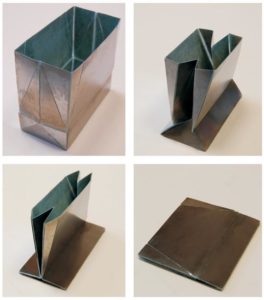 This is an amazing application of origami: a steel grocery bag that can fold flat!
This is an amazing application of origami: a steel grocery bag that can fold flat!
http://news.sciencemag.org/sciencenow/2011/03/paper-plastic-or-steel.html
Although you probably wouldn’t want to carry these to the store with you, this result could have real applications in industrial packaging. In addition, it’s another step towards the mathematical-origamist’s dream: designing building that can rearrange and rebuild itself as needed!
A great talk by Erik Demaine on mathematical origami opened my eyes have this amazing application of mathematics, and my students and I have been having a lot of fun with folding ever since!
